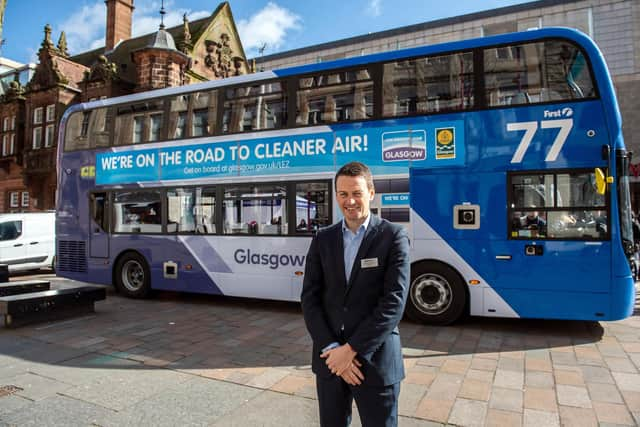Bus passengers warned of ‘significant’ fare increases and service cuts if Scottish Government funding ends
The warning from Glasgow and Aberdeen’s main operator First was echoed by other senior industry figures, one of whom said Scotland faced a “looming cliff edge” because of the likely widespread impact on the most vulnerable people.
The threatened axing of the Network Support Grant Plus (NSG+) scheme comes despite similar funding being extended until March in England and Wales.
Advertisement
Hide AdAdvertisement
Hide AdFirst Bus Scotland managing director Duncan Cameron said: “If funding does end, operators will have to look at fare revisions again and some routes will struggle to be sustainable.


"Some hard decisions will have to be made.”
Buses account for 75 per cent of Scotland’s public transport, with more than 250 million trips a year – four times as many as by rail.
However, passenger numbers are still 20 per cent down on pre-Covid levels and operators are struggling with staff shortages and surging costs such as fuel.
Journeys by the over-60s and others eligible for free travel, which accounted for 40 per cent of total bus trips before the pandemic, are down by one third as older people harbour Covid fears.
Transport minister Jenny Gilruth announced in June a three-month extension of the NSG+ scheme at a cost of £25.7 million, weeks after The Scotsman revealed her officials had accepted that axing it would trigger “sharp cuts”, particularly in rural areas.
Ralph Roberts, UK president of the Confederation of Passenger Transport, which represents operators, said there would be “significant” fares increases and around 17 per cent of bus routes scrapped in some areas if the funding wasn’t extended.
Roberts, who is also managing director of McGill's Buses, which runs services in Inverclyde, Dundee and across the Central Belt, said it would put Scotland “significantly out of step with the rest of the UK”.
He said: “It will mean a reduction in bus routes and an increase in fares that is absent in other areas of the UK.
Advertisement
Hide AdAdvertisement
Hide Ad"As Scotland is 42 per cent of the UK’s land mass yet only 9 per cent of the population, I fear the impact on the people of Scotland will be so much greater.
“It will disproportionately punish those at the bottom of the socio-economic ladder who cannot afford a car and must use the bus to access jobs, healthcare and education.”
Another industry leader said: "Bus is the one mode of transport critical to the local way of life.”
A Scottish Government spokesperson said: “We are committed to supporting our bus industry to encourage the shift away from cars towards sustainable public transport for the benefit of our health, climate and communities.
“We provided £93.5m in April to support the bus network as we recover from the pandemic, with an additional £25.7m being provided to extend recovery funding until October.
"This is in addition to £210m we’ve provided during the pandemic to ensure bus operators are at the forefront of our green recovery.
“Future support will be informed by the Scottish Government’s emergency budget review, but it’s important the support we give transport operators continues to adapt and evolve to make sure it remains fit for purpose and is sustainable long term."
Comments
Want to join the conversation? Please or to comment on this article.
